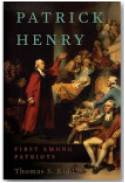|
|
|
Patrick Henry has long been a favorite of activists on both ends of the political spectrum, and it's not hard to see why. He's best known for his oratory skills, which are easily co-opted to fit a variety of views even today, and he was revered by men on both sides of the Civil War. Though he held views that were mostly typical of his age, to modern eyes he seems like a walking contradiction. He called himself a Christian, but was content to own slaves. He was sympathetic to the evangelical cause of his day, but never left the Anglican Church. Perhaps most confusing to moderns is the fact that he was a key leader in the Revolutionary War, but vehemently opposed the U.S. Constitution.
Thomas Jefferson, writes Kidd, thought Henry was the sort of man who could say nearly anything and get away with it. Today that legacy extends to almost anyone who wishes to call upon Henry to support their cause: he is often misquoted. For example, he probably never spoke the second-most famous utterance that history has ascribed to him: "if this be treason, make the most of it!" Kidd argues that Patrick Henry would not fit neatly into either the Left or the Right today, but would instead remind members of both groups to "reconsider the value of public morality . . . True freedom, he might warn us, lies not in doing whatever we want. Freedom is doing what we should do, for the sake of community and the republic." Henry may be popularly misunderstood, but he is nonetheless a remarkable figure from whom we can learn much. (Basic Books, 2011, 306 pp., $28) |
 Though his seemingly contradictory stances have made it easy for many causes to claim Henry as their standard bearer, Thomas S. Kidd demonstrates in his newest book that Henry's views were not unique and that he was a more complex figure than is typically assumed. Kidd, a professor of history at Baylor University, offers a positive look at the real founding father in Patrick Henry: First Among Patriots.
Though his seemingly contradictory stances have made it easy for many causes to claim Henry as their standard bearer, Thomas S. Kidd demonstrates in his newest book that Henry's views were not unique and that he was a more complex figure than is typically assumed. Kidd, a professor of history at Baylor University, offers a positive look at the real founding father in Patrick Henry: First Among Patriots.

